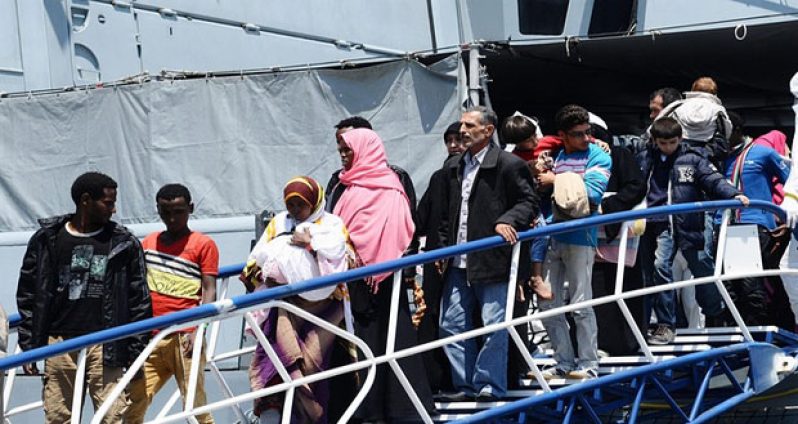THE number of migrants to have arrived in Italy by boat this year passed 50,000 at the weekend, as over 5,800 people were rescued in the Mediterranean.A total of 3,480 people were rescued on Saturday from 15 separate boats that set off from Libya, and more rescues were ongoing on Sunday. The international effort involved the Italian authorities and naval ships from the UK, Ireland and Germany.

It has been one of the busiest weekends so far this year for rescues in the Mediterranean, the start of an uptick over the summer months as people-smugglers take advantage of calm seas.
As of Thursday the Italian interior ministry had registered 48,905 arrivals, meaning the total for 2015 is now above 50,000.
Following in a message from the European Union Ambassador in Guyana on the crisis:
The issue of the Mediterranean migrant crisis has received extensive international attention, and the tragic loss of lives in the Mediterranean that has resulted from criminal organisations profiting from migrant smuggling and human trafficking has shocked the world. I would like to take this opportunity to outline the actions the European Union is taking in order to alleviate the situation. The most immediate objective of the EU’s policy on migration is to save lives and prevent the exploitation of migrants.
An important dimension of ending the current tragic situation is to strengthen EU search and rescue operations. To this end, the EU has tripled the capacity and budget for search and rescue operations in the Mediterranean. These operations are already bearing fruit – in May 2015, 188 search and rescue operations were conducted, with 30,700 migrants rescued at sea. Despite the 25% increase in arrivals, in comparison to 2014, the number of deaths in May 2015 has decreased to 95, significantly lower compared to 329 in the same month last year. Furthermore, in May 2015, the EU decided to establish a military crisis management operation to provide surveillance and intelligence-sharing assessments for potential operational engagement against people smuggling in the south-central Mediterranean. This operation is designed to contribute to the disruption of human smuggling and trafficking networks by undertaking systematic efforts to identify, capture and dispose of vessels and assets used or suspected of being used by smugglers or traffickers. The processing of persons rescued at sea in accordance with international law and respect for human rights is a fundamental aspect of the operation.
While an important dimension of efforts to resolve this crisis is law enforcement and judicial cooperation, we also recognise that migration is a multifaceted phenomenon. It involves aspects of economic and political stability, human rights, security, crisis management, conflict prevention, peace building, humanitarian and development policy aspects as well as other challenges, for example climate change. Managing migration flows can only be effective through international cooperation between countries of origin, transit and destination. Effective return, readmission and reintegration policies for those migrants not qualifying for protection are an essential part of combating illegal migration and will help discourage people from risking their lives.
Respect for migrants and refugees is a key component of EU policies and in the past decade we have advanced policies on protecting migrants’ rights. Equality is enshrined in the European Convention on Human Rights and in the Charter of Fundamental Rights of the EU which apply both to EU citizens and to non-EU nationals. The EU has also implemented unparalleled standards on social security rights for migrants and is committed to fighting racism, xenophobia and discrimination against migrants or of persons from migrant backgrounds, smuggling and trafficking in persons.
It is through these multifaceted and comprehensive policies that the EU will halt the terrible suffering and loss of life being caused by unscrupulous people smugglers and human traffickers in the Mediterranean.
Ambassador Robert Kopecký
European Union Delegation



.jpg)









